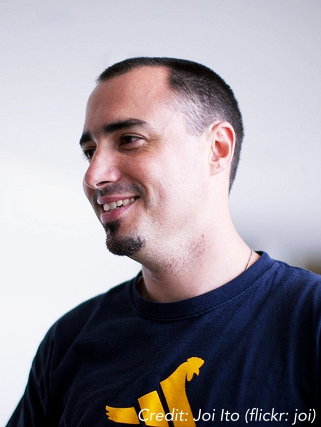Union Square Ventures’ Nick Grossman on Building the Future for Startups
Nick Grossman is general manager of policy and outreach at Union Square Ventures, a New York City venture capital firm with a billion dollars invested across six funds.
Union Square Ventures (USV) is probably best known for its investments in dozens of companies that have transformed modern life around the world. They include the payments network Dwolla, the online arts, crafts and gifts marketplace Etsy, Meetup, Twitter, Tumblr, and Twilio, to name a few. (It has the potential to become even more well-known since Lionsgate optioned the rights to New York Times Columnist Nick Bilton’s book Hatching Twitter last December. USV Partner Fred Wilson plays an important role in the tale.)
Apart from its many prescient investments, USV has also taken a leading role in public policy by actively engaging lawmakers in discussions about how social norms and rules might evolve as emerging technology networks re-shape our own traditional relationships in society, whether it concerns finance, finding a hotel room or a ride across town. Many of its partners often speak and blog publicly about issues such as net neutrality, copyright policy, and open networks. The common theme for USV is networks and how technology-enabled peer-to-peer relationships are changing our heretofore hierarchical society.
Grossman himself landed his job at USV just when the company started becoming more involved with the wider start-up community and Web 2.0 companies to put the brakes on the proposed Stop Online Piracy Act (SOPA) and the PROTECT IP Act (PIPA) between 2011 and 2012. Critics feared that the legislative proposals could have resulted in random black-outs of user-generated Web sites – i.e. entire sectors of the Web 2.0 economy. Obviously, the legislation would have been disastrous for many of USV’s investments.
Grossman started working at USV at the end of 2011 when large coalitions of companies, investors, activists and public interest groups organized to protest against the proposed legislation. He worked with USV and the coalitions to put together the January 2012 protests, which were unprecedented in their scale both online and off. They successfully staved off the enactment of the bills, but like a lot of other people in the business of disruption, the experience left the partners realizing that it would be better to more actively engage lawmakers rather than ignoring them and letting incumbents do all the talking.
“We really need to get more involved in debating policy, and working through the changes involved that are going to establish the information society, the connected society,” Grossman told the Disruptive Competition Project in a recent interview.
Grossman, 35, is an entrepreneur with an interest in civic engagement, technology and public policy. Below, he discusses his work at USV, the company’s investments in music-related companies, fair use, and how startups need advocates too.
Q: What do you do on a daily basis?
A: I work with all the portfolio companies, either with their general counsels or their executive teams to work on whatever issues they may be facing. I work with lawmakers and regulators, and advocates at public interest organizations, whether DC or elsewhere, and academics who are thinking about the issues that are relevant here, and with other investors.
It’s on every issue whether it’s ride sharing, or copyright, or Bitcoin, or privacy and trust. It’s everything from trying to think ahead about the potential consequences of new technologies, whether that’s big data in the healthcare space, and what that’s going to mean in terms of trust and privacy, to BitcoinThere are issues like that we try to think ahead about. What are some of the benefits of the new technologies? What are some of the complicating factors are going to be?
Right now, patents are starting to be looked at in the House and the Senate. In that case, we’ve been spending time talking to the lawmakers and going to events in DC, and engaging in trying to represent the startup perspective.
One of the things that’s becoming evident is that by definition, Internet and mobile startups are pushing the boundaries of how we do things, and how we solve problems, and they’re also raising many new regulatory issues of their own.
[In the realm of music] one of the major barriers to building a business is figuring out a way to navigate licensing and copyright issues.
One of USV’s investments is SoundCloud. I think the really, really amazing thing that SoundCloud has done is build up a platform where people want to upload their own original content, whether that’s the sounds of the Earth, or the subway pulling into the station, or a song that they recorded.
What they’ve done is make a place where people are encouraged and incentivized to upload original content. Even artists that have original recording deals, by and large things that they’re putting on SoundCloud are the originals, and they control the rights.
One of the things that we liked about SoundCloud so much is that their business, unlike the businesses of Spotify, Pandora, and Rdio, doesn’t depend on negotiating content licenses with publishers at the outset, and instead gets people to publish on their own. You’re beginning to see artists like Lorde starting out by publishing their work on SoundCloud and then becoming a star.
Like any user-generated content site, SoundCloud has to be aware of issues where people are uploading copyrighted content without permission. Every site where that’s possible, they reply and respond to DMCA takedown notices. I think the real genius of SoundCloud is that they encourage people to publish their content under their own control, and sharing that has value because it builds your brand, and it builds your audience.
I think a lot of times the progressive view on copyright is that maybe the way of the future is that maybe it’ll be less important to control the rights to every piece of audio, and that you can use the domain of the Internet to build value elsewhere. SoundCloud has proven that out.
It’s not about trying to pry content out of the hands of rightsholders against their will. But it’s about them gladly publishing things that they have the rights to, and that builds value in other ways.
While we really like SoundCloud’s approach to entering the audio market — avoiding up front licensing deals with publishers by focusing on user-created content — that approach isn’t necessarily a requirement for us.
For example, Turntable.fm was a really creative and interesting take on streaming music — a virtual club and DJ booth with lots of social dynamics. They took a licensing-first approach, and while Turntable didn’t ultimately become a sustainable business, it gained a strong initial following.
In our view, the licensing approach wasn’t the thing that made SoundCloud succeed and Turntable fail — but rather that SoundCloud was able to build an experience that was more engaging to users over the long term.
There are several other USV investments in music companies. There’s a newer investment in a company called Splice, which is a platform for re-mixing and collaborating on audio, sort of like GitHub for music. It builds on the idea that musicians of the present and the future are much more likely to have an open-source view of collaborating and creating things, and what that means for ownership.
I think they’re going to similarly put a fair amount of effort into educating their community about what copyright is, and how it fits with the platform, and different approaches to licensing and structured collaboration.
That one is very similar to SoundCloud in that it makes it easy for people to share and collaborate openly. So making sure that people have a good understanding of licensing is important. The whole point is to make the process easy, and fun, and productive with their creations. I’m a believer in that idea. A lot of it is going to be like SoundCloud.
You’re likely to see the creation of a new kind of behavior regarding ownership and licensing of creative content that really wouldn’t have been possible in the pre-Internet era. It kind of exposes a mindset that might not have been possible in the pre-Internet era.
I’ve been working with them a little on licensing and integrating licensing into the platform, and looking a lot at GitHub and looking at things like The Creative Commons.
The creative process for making music, and music collaboration process is still pretty old fashioned and analog right now.
I just can’t wait to see how people use Splice, and how that changes what it means to be a musician. I’m particularly interested in the Long Tail. I don’t have to be a professional musician to fork somebody’s track on Splice and put my son’s voice on it or something. It’ll be really neat, and enable new kinds of uses of music that haven’t been possible before.
Q: So the approach by USV to media is to invest in companies that build technology to enable people to create works?
A: Yeah, that’s what Twitter is, that’s what Tumblr is. That’s what FourSquare is. That’s what Wattpad, a platform for writers and readers, is. A tremendous amount of content is being created on Wattpad. It’s the same Long Tail effect, with people creating books with 250 chapters on Wattpad, and each chapter is informed by the comments from comments on the previous chapter … and you’ve got a huge fan fiction section. It’s the same idea of creating out in the open, sharing it, and connecting with the audience in real-time.
Q: So the idea of fair use is key to this process.
A: So it’s fair use and open licenses. The two go hand in hand. So think for a site like Tumblr, which is a USV investment, but no longer part of the portfolio, that’s very much part of a community that takes existing content and comments on it, and re-mixes it and comments on it. So that’s very much about fair use.
With things like Wattpad and Splice where you’re actually making content and collaborating, it’s about going into it knowing that you’re entering into an open and collaborating environment. Wattpad is a way to build a profile and an audience for writers, especially young writers.
Q: So your job is to explain this stuff to policymakers?
A: Part of it is. We’re investors in new ways of doing everything, whether that’s creating music, or funding startups or whatever, and a lot of it is counterintuitive and hard. So a lot of it is explaining seemingly disparate issues.
The other part is how to be an effective advocate on these issues, coming from a place of inherent weakness. We’re talking about tiny companies that don’t have lobbyists and don’t have established political connections.
A lot of cases they’re doing really interesting things that have the potential to unlock new ways of doing things, but at the same time, it’s equally threatening to [incumbents.]
So as someone once put it to me, it’s the worst possible quadrant to be in in terms of politics.
Image Credit (cropped): Joi Ito (flickr: joi) Creative Commons BY 2.0








